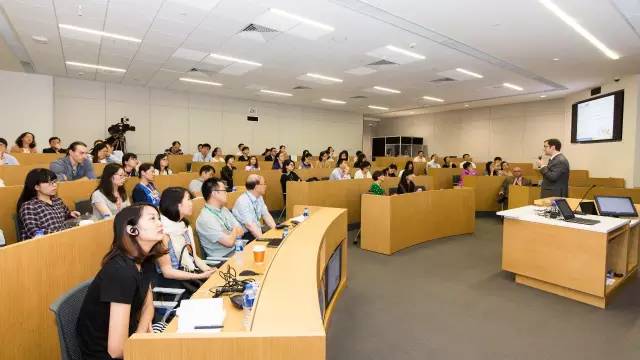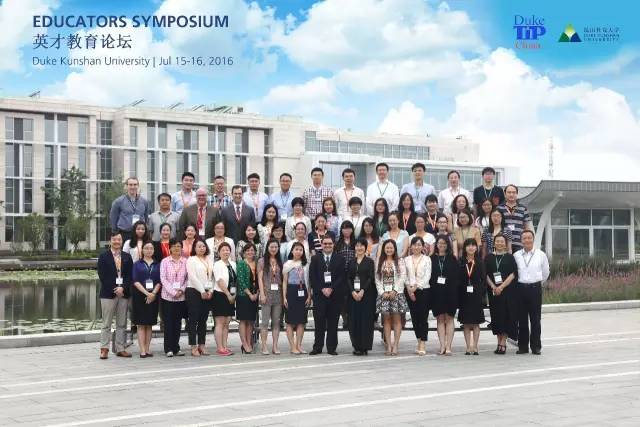Why do we need gifted education? How do we identify students who are gifted? What can teachers do to help those superstars shine even brighter?
At the 2016 Educators Symposium held at Duke Kunshan University on July 16, you may find some interesting answers to these questions that have been troubling teachers, veteran or novice, for generations.
The theme of this year’s educators symposium, ‘Gifted and Talented Education: Meeting the Needs of Academically Talented Students’, is becoming a topic of increasing importance as the one-size-fits-all teaching strategy gradually falls out of public favor. Over 65 educators, school presidents and teaching professionals gathered together on the Duke Kunshan campus to hear from researchers and experienced practitioners about current research, identification and assessment tools, and to discuss successful interventions particularly for gifted students.

‘In this era of information and technology explosion, regular curricula can no longer satisfy the educational needs of gifted students,’ Liu Jingnan, chancellor of Duke Kunshan University pointed out in his opening remarks. ‘The various challenges facing our world today urge educators to foster independency, curiosity and information screening ability in these students.’

Chancellor Liu Jingnan
The symposium coincided with the Duke Talent Identification Program (TIP) Summer Studies Program held at Duke Kunshan University, which offered the attendees an opportunity to observe the TIP classes and to learn from their pedagogical approaches. The Duke TIP Summer Studies Program is a three-week residential program for academically talented students from grades 8’10 characterized by its innovative curriculum design and teaching approaches tailored for gifted students.
Teachers and school administrators from K-12 institutions and universities from around China were impressed by the unique learning environment and project-based, interdisciplinary pedagogical approaches TIP adopted after observing three classes at Duke Kunshan. ‘The intimate teacher-student relationship in the TIP classroom is mind-blowing,’ said Zhu Wenqian, a teacher from Nanjing University of Technology who attended the Symposium.
Bridging Research and Practice
‘Students learn at different rates, but we group them by age.’ This sharp criticism made by Dr. Matthew Makel, Duke TIP’s director of research, represents a prevalent problem not only in the U.S. K-12 system, but on a global scale. ‘In the United States, school does not equal learning ‘ research shows that for initially high-performing students, their learning rate does not differ between whether or not they are in school.’
Ability grouping and acceleration, as Makel mentioned in his speech, are two major categories of possible solutions for addressing these gifted students’ individual learning needs at school. And according to recent research, cross-grade grouping for subjects, individualized curriculum and extra advanced courses are among the most effective ones among all proposed interventions.
But intervention is not the first step in gifted education ‘ teachers can only ‘prescribe appropriate intervention’ after a precise ‘diagnosis’. ‘Educators should look at early indicators of extraordinary intellectual promise that can help us identify individuals who go on to make truly outstanding contributions,’ said Makel.

Dr. Matthew Makel
Building on Dr. Makel’s remarks on talent identification, Dr. Sisi Chen from Beijing Metrics introduced to the audience the idea of computer adaptive assessment, as well as the role of diagnostic assessment in gifted education.
‘MAP’s adaptive test adjusts the difficulty level of items based on the accuracy of each student’s answer to each test item, and is therefore a more accurate measurement for both high and low performing students,’ said Chen.
According to Chen, the adaptive test is more than ‘an accurate test’ ‘ it can do what regular tests cannot. ‘Measuring students’ performance with adaptive testing tools over time allows teachers to predict growth and design individualized programs to keep students on the right track.’

Practitioners’ Insights
The keynote speaker Tang Shengchang is one of the biggest names in China’s K-12 education. He is the superintendent of Shanghai Starriver Bilingual School, the head of the Shanghai Institute of International Research, and a long-recognized guru in curriculum design. Tang’s speech on ‘Innovative Curriculum’ unveiled to the audience his most coveted secret to talent education success.
‘Curricula for different grades should be designed differently to respond to the diverse needs of students at different developmental stages.’ In his presentation, Tang outlined the fundamental guidelines for curriculum design for high schoolers and middle schoolers respectively. ‘Middle school students’ interest in a particular subject is usually driven by their life experiences, hence innovative courses for them should be centered around fun projects; while innovative courses at high-school level should be more interdisciplinary and modern.’
He also recounted his experience of overhauling the science project at Huayu Middle School and designing a module-based curriculum at Shanghai High School ‘ both are regarded as textbook cases of success in curriculum reform. ‘Within two years, the number of first-prize winners of Shanghai Adolescents Science & Technology Innovation Contest from Huayu Middle School has increased more than tenfold.’ Before founding Starriver Bilingual School, Tang was the former president of Shanghai High School and Huayu Middle School, ‘the best high school and middle school in Shanghai,’ according to Tang.

As an experienced AP English Literature teacher, Brian Cooper, Duke TIP’s director of educational innovation and outreach, shared his experiences of effective teaching from an American teacher’s perspective. In addition to guided in-class discussions and fun assessments in various forms, Cooper also used a ‘dialectical notebook that encourages active reading and helps students record their ‘dialog’ with a text’ as pre-class assignments.
‘Although these are classroom strategies for English Literature classes, I hope teachers of other subjects can apply these practices in their particular disciplines,’ said Cooper.

Brian Cooper
The Symposium also featured a panel discussion on education in the 21st Century, at which Chancellor Liu Jingnan joined other guests in discussing the purpose of gifted education. ‘The challenges facing the 21st Century are many and complex; therefore, the aim of gifted education should be fostering leaders who will respond to these challenges,’ said Liu. ‘Social responsibility and ethics are as important as knowledge in gifted education.’


